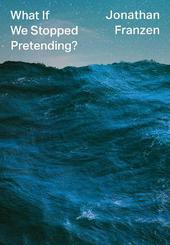
|
What If We Stopped Pretending?
Paperback / softback
Main Details
| Title |
What If We Stopped Pretending?
|
| Authors and Contributors |
By (author) Jonathan Franzen
|
| Physical Properties |
| Format:Paperback / softback | | Pages:80 | | Dimensions(mm): Height 160,Width 111 |
|
| Category/Genre | Literary essays
Environmentalist thought and ideology |
|---|
| ISBN/Barcode |
9780008469658
|
| Classifications | Dewey:363.73874 |
|---|
| Audience | |
|---|
|
Publishing Details |
| Publisher |
HarperCollins Publishers
|
| Imprint |
Fourth Estate Ltd
|
| Publication Date |
21 January 2021 |
| Publication Country |
United Kingdom
|
Description
The climate crisis is here. Our chance to stop it has come and gone, but this doesn't have to mean the world is ending. 'If you care about the planet, and about the people and animals who live on it, there are two ways to think about this. You can keep on hoping that catastrophe is preventable, and feel ever more frustrated or enraged by the world's inaction. Or you can accept that disaster is coming, and begin to rethink what it means to have hope.' The honesty and realism of Jonathan Franzen's writings on climate have been widely denounced and just as widely celebrated. Here, in his definitive statement on the subject, Franzen confronts the world's failure to avert destabilising climate change and takes up the question: Now what?
Author Biography
Jonathan Franzen's work includes four novels (The Twenty-Seventh City, Strong Motion, The Corrections, Freedom), two collections of essays (Farther Away, How To Be Alone), a memoir (The Discomfort Zone), and, most recently, The Kraus Project. He is recognised as one of the best American writers of our age and has won many awards. He lives in New York City and Santa Cruz, California.
ReviewsPraise for The End of the End of the Earth: '... by refusing to hope for the impossible, Franzen, improbably, manages to produce a volume that feels, if not hopeful, then at least not hopeless. There's nothing he can do - there's probably nothing any of us can do - to avert or even alleviate the coming catastrophe. But for now, he's here and he's alive, and over the course of these essays he offers us a series of partial, tentative answers to the question he poses himself at the beginning: " How do we find meaning in our actions when the world seems to be coming to an end?" Guardian 'Can be read, in part, as a welcome alternative to the current, dominant American political tone of one-note belligerence' Observer 'Franzen shows himself to be the kind of unacademic critic who recognises and does not disapprove of the Common Reader's natural tendency to feel for the characters the author has brought into being' Scotsman
|